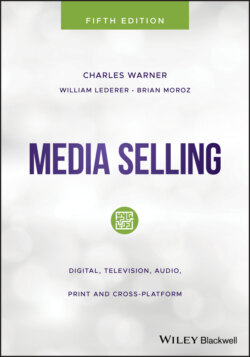Читать книгу Media Selling - Warner Charles Dudley - Страница 95
Five Ethical Responsibilities for Media Salespeople 1. Responsibility to consumers
ОглавлениеAs defined in Chapter 1, consumers use a product and the consumers of the media are the audiences – users, readers, viewers, listeners, or subscribers.
In 2018 the information industry credibility hit an all‐time low, according to the Center for Media Research.11 Criticism of fake news came from all sides of the political spectrum, especially from the right. So to avoid being labeled fake news and to attract audiences desirable to advertisers, the media must put the needs of the majority of its consumers first. If a media outlet does not put the interests of its consumers or audience first, the audience will eventually gravitate to sources of information and entertainment that do. If a media outlet does not tell the truth, withholds important information from consumers, sells shoddy products, or erodes consumers’ values and sense of self‐esteem, these consumers will eventually turn to information, entertainment, and opinion sources that provide what they want, what they agree with, and that they find truthful, useful, interesting, and convenient.
Audiences want something in which they can believe. Therefore, the media should not transmit false or misleading news or advertising. General rules for media salespeople should include not accepting advertising for products that are unsafe. People do not like to be deceived, especially by the media. Thus, when a medium lies to its audience and loses its credibility, it eventually loses its audience, and can no longer be advertiser supported. Putting the consumers first is at the heart of the marketing concept, and is the essence of ethical behavior in the media.
In 2017 Facebook hired 8,500 people to manually review content that had been rejected for publication by Facebook’s algorithms. Facebook also changed its algorithms in its News Feed to show users fewer news items and more personal items. Facebook made these changes because Facebook users, critics in the media, and critics in the government were concerned about fake news, and Facebook wanted to regain the trust of users, critics, and politicians. Facebook’s attempts to address the problem of fake news without government passing restrictive regulations was an example of an important medium where people get a large portion of their news self‐regulating, of putting the needs of consumers first, before its own need for profits.
